The excitement in the air was quite palpable at the 7th CII Global Summit on Skill Development 2016, as there was hectic activity at the registration counters and the sponsors were giving final touches to their booths. The location was strategic, and the day – historic! While the world was waiting to know the American presidential election results and India was overcoming the shock of demonetizing Rs. 500 and Rs 1000 notes, Hyderabad was all charged up to discuss skill development for global mobility, productivity, industry demand and supply of skilled workforce at the 7th CII Global Summit on Skill Development 2016, held at Taj Krishna on 9th and 10th November. The report is presented in 4 parts. Click here to read Part 2, Part 3 and Part 4.
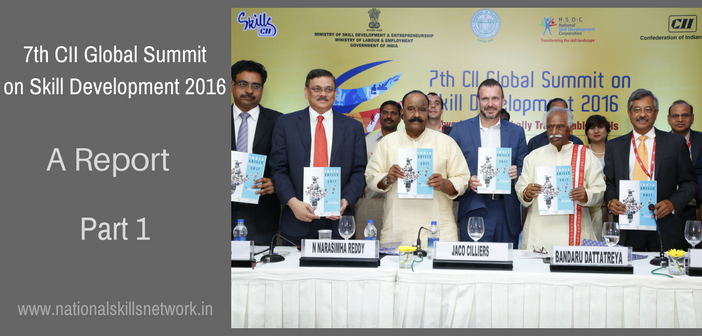
The Summit witnessed active participation from over 400 national and international delegates and over 40 speakers (industry, government, sector skill councils, training partners, international organizations and foundations) and 20 sponsors who showcased at the venue. A key highlight was the release of India Skills Report 2017 by Honourable Union Minister for Labour and Employment, Mr B Dattatreya. On this occasion, 2 MoUs were signed between Telangana Academy for Skill and Knowledge (TASK), BSE Institute Ltd and Call Health.
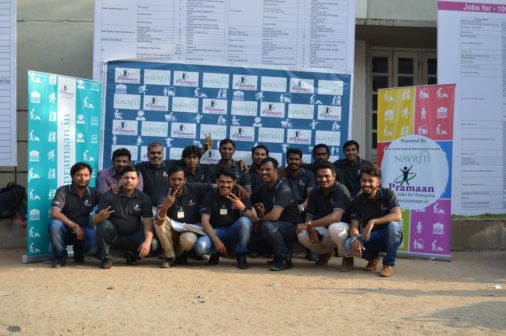
The CII – Pramaan Job Fair at Government Polytechnic College, Hyderabad, drew enthusiastic youth as there were more than 3000 visitors with 300+ candidates getting shortlisted for jobs. The impact sessions had live stories of success from different sectors like hospitality, automotive and healthcare where we saw young migrant women and men sharing their journey and challenges in getting skilled and gainfully employed. We also saw students from the hospitality training demonstrating their skills in fruit, vegetable and ice carving, while there was a Zumba showcase from the Beauty and Wellness sector on dancing away to fitness, showing the potential for self-employment for Zumba trainers. The networking dinner provided a great opportunity to connect with professionals from the industry, training companies, academia and non-profit organizations.
Mr. Pramod Bhasin, Chairman, CII National Committee on Skill Development
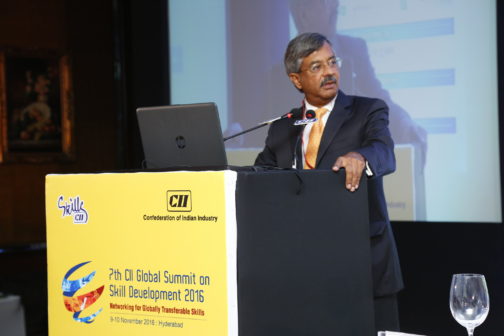 In his welcome address, Mr. Pramod Bhasin emphasized on the need to train people with global standards. He underlined the need to create a link between the industry and training while ensuring that trained people are well-paid and find it worthy. At the same time, he reiterated the need for the training industry and the government to work together and explore ways to deal with the unorganised workforce which constitutes nearly 85 % of the entire workforce.
In his welcome address, Mr. Pramod Bhasin emphasized on the need to train people with global standards. He underlined the need to create a link between the industry and training while ensuring that trained people are well-paid and find it worthy. At the same time, he reiterated the need for the training industry and the government to work together and explore ways to deal with the unorganised workforce which constitutes nearly 85 % of the entire workforce.
Download the report: Click here to download the complete report on the proceedings of the event in PDF format.
The need for considering various aspects of the skilling ecosystem were brought out clearly while he said “We need to focus on entrepreneurship, which is unfortunately not something that comes naturally to many. Unless we strike a balance between entrepreneurs, organised work force, bring more women migrants’ issue, economic diversity and unorganised work force, we cannot grow as a country and if we do not do so, majority of our workforce will be left in wilderness unprotected by social security, labour laws change in work practices”.
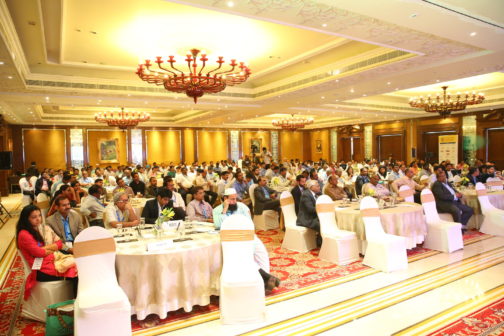 He further added that in a country as complex as India, there are many challenges to skilling! He was happy with the astounding response to the Summit as a huge hall packed with enthusiastic delegates is the ultimate testimony to the success of any Summit. He appreciated the momentum and awareness skill development is getting through more it is and Sector Skill Councils being recognized by employers and trainees. “Now we need to take it to the next level, building a nation of skilled and highly efficient workforce. Government and industry must come together for creating and implementing a strategic roadmap to train 50 million people in120 skills, with necessary softs kills to make them employable over the next 5 to 10 years – challenge ahead of us.”
He further added that in a country as complex as India, there are many challenges to skilling! He was happy with the astounding response to the Summit as a huge hall packed with enthusiastic delegates is the ultimate testimony to the success of any Summit. He appreciated the momentum and awareness skill development is getting through more it is and Sector Skill Councils being recognized by employers and trainees. “Now we need to take it to the next level, building a nation of skilled and highly efficient workforce. Government and industry must come together for creating and implementing a strategic roadmap to train 50 million people in120 skills, with necessary softs kills to make them employable over the next 5 to 10 years – challenge ahead of us.”
Mr. S. Mahalingam – Chairman of CII Sector Skills Councils and employment
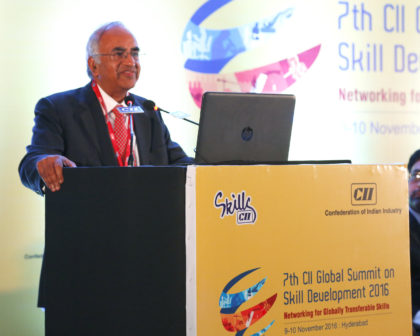 Recalling his association with different industries, and referring to the amount of money spent on training, Mr. S. Mahalingam felt that it would be easy to spend that kind of money if the margins are high. This is because, in the industries, where the margins are lower, the relevance of skilling and employability and productivity wouldn’t’ make a difference.
Recalling his association with different industries, and referring to the amount of money spent on training, Mr. S. Mahalingam felt that it would be easy to spend that kind of money if the margins are high. This is because, in the industries, where the margins are lower, the relevance of skilling and employability and productivity wouldn’t’ make a difference.
While describing the economic aspects of skilling, he pointed out several key issues, when he said, “we have embarked on a national mission and in the process of training thousands of people, extra care and quality check is required to train these youth to bag jobs. There are 41 active sector skill councils today and these are essentially important to increase the current pace of skill development in India. Some of the SSCs are promoted by CII; they have developed qualification frameworks etc. However, we are not able to overcome the low employability ratio; the data is not tracked, hence we need to form a task force to work on employment.”
He also stressed on the need for an organized way to manage skill deficit, when he said, “demand and supply gap should be worked at the state level not just national level. We need to create icons and medals in World Skills Competitions and be the force to reckon with by demonstrating our skills and abilities. And, there is an urgent need to create the linkage between training, training partners and the assessment partners.”
Dr. Jaco Cilliers – Country Director UNDP
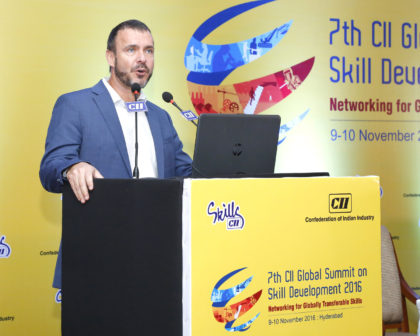 Dr. Cilliers’ talk had all the elements of connecting the dots in the evolving skilling environment in India. While expressing the dire need to make the skilling exercise inclusive and holistic, he said, “ a major direction to increase skill growth in the country will be to create gender equality among men and women. Equal workforce participation is a primary factor that enhances the skill growth in the nation. The workforce equality has been constantly dropping each year. We need to talk about bringing in more efforts to keep the skilling process active all the time and we also need to focus on how these skilling policies and initiatives reach the various sectors of the society. For instance, multiple stakeholders have funded many projects initiated in Telangana. It is necessary to find out the number of job openings first and then make sure that they are equally available for both men and women. This works best when the skill acquired formally connect with sustained employment and job opportunities.”
Dr. Cilliers’ talk had all the elements of connecting the dots in the evolving skilling environment in India. While expressing the dire need to make the skilling exercise inclusive and holistic, he said, “ a major direction to increase skill growth in the country will be to create gender equality among men and women. Equal workforce participation is a primary factor that enhances the skill growth in the nation. The workforce equality has been constantly dropping each year. We need to talk about bringing in more efforts to keep the skilling process active all the time and we also need to focus on how these skilling policies and initiatives reach the various sectors of the society. For instance, multiple stakeholders have funded many projects initiated in Telangana. It is necessary to find out the number of job openings first and then make sure that they are equally available for both men and women. This works best when the skill acquired formally connect with sustained employment and job opportunities.”
His Excellency Dr. Mbuya Isaac Munlo, Malawi High Commissioner to India
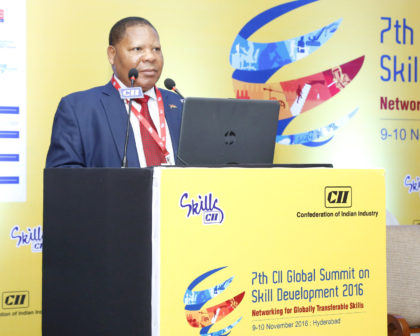 The fact that issues related to vocational training are not just India’s problem alone, came out very strongly in the inaugural address by Dr. Munlo. His talk brought out some priority issues that we need to address immediately as was evident in his address. “Vocational training and education will definitely play a crucial role in the process of skill development. Our target audience being youth and young unemployed people from the under developed areas of our country, we need to focus more on mobilisation and the counselling. We need to understand our demographic dividend and act accordingly with right initiatives. This has to be supported by building proper infrastructure and use good equipment for the process of skill development. Reaching out to the target audience with updated infrastructure and easy access to training centres is the right thing to do in order to promote skill development. “
The fact that issues related to vocational training are not just India’s problem alone, came out very strongly in the inaugural address by Dr. Munlo. His talk brought out some priority issues that we need to address immediately as was evident in his address. “Vocational training and education will definitely play a crucial role in the process of skill development. Our target audience being youth and young unemployed people from the under developed areas of our country, we need to focus more on mobilisation and the counselling. We need to understand our demographic dividend and act accordingly with right initiatives. This has to be supported by building proper infrastructure and use good equipment for the process of skill development. Reaching out to the target audience with updated infrastructure and easy access to training centres is the right thing to do in order to promote skill development. “
Mr N. Narasimha Reddy: Honourable Minister Labour, Employment and Training, Government of Telangana
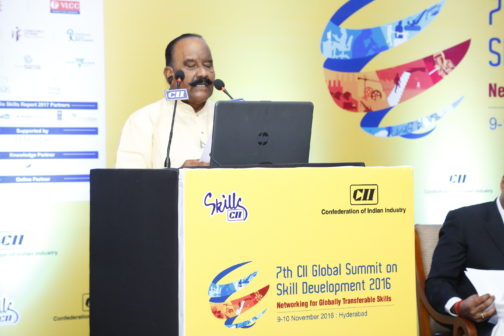 “The initiatives taken by the Government of Telangana are in the right direction and there is ample commitment to skill development and entrepreneurship.” This was the message from Mr. N Narasimha Reddy, while he began his talk by appreciating the efforts of CII. He said, “It is a positive sign that the skill development summit is being held in Telangana. Networking for globally transferring skills is basically allowing people to work in various places of the world thoroughly equipped with all the skills. It is definitely a boon for the country if the youth are skilled accurately, as of now, India as a country is rapidly growing in this arena, but it is time we focus on the flaws and changes we can bring about in the system”.
“The initiatives taken by the Government of Telangana are in the right direction and there is ample commitment to skill development and entrepreneurship.” This was the message from Mr. N Narasimha Reddy, while he began his talk by appreciating the efforts of CII. He said, “It is a positive sign that the skill development summit is being held in Telangana. Networking for globally transferring skills is basically allowing people to work in various places of the world thoroughly equipped with all the skills. It is definitely a boon for the country if the youth are skilled accurately, as of now, India as a country is rapidly growing in this arena, but it is time we focus on the flaws and changes we can bring about in the system”.
Describing the investor-friendly ecosystem in Telangana that can support international ventures in skill development, he said, “observing the signs of development, it is time we partner with different countries globally and work towards this mission of a common global skill qualification framework. A lot of people from Telangana migrate to the gulf countries for work. Engineering colleges, construction, ITES are all undergoing certain changes to make the skill development process more impactful. The state of Telangana promotes entrepreneurship through T-Hub, a world class facility for startups and new ideas. We, as a country, need to work together and make our country the largest skill capital in the world.”
Mr. Bandaru Dattatreya, Honourable Union Minister for Labour and Employment
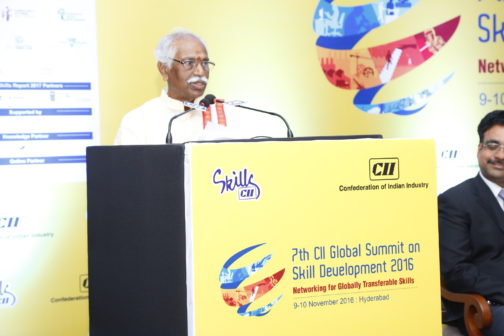 Mr. Dattatreya’s inaugural talk was a fervent effort at positioning the young state of Telangana in the bigger picture of economics of skilling, employability and entrepreneurship. His message echoed the sentiments of the people of the state as he said, “Telangana has been selected as the best state for ease of doing business, and that there are more and more stakeholders and investors and start-ups coming up in the state. The PM has three major flagship programs: Make in India, Skill India, Start-up Stand-up and also Digital India. He also referred to the importance of formation of independent ministry for skill development and entrepreneurship. “Make in India” can increase avenues in many industries and skill India will give rise to more man power. India should be the world capital for skills. 80% of the population is capable to get opportunities at the global level, India’s biggest asset is trained workforce, but there is a lot of mismatching. By 2025, 30% of the world’s labour force will be from India.”
Mr. Dattatreya’s inaugural talk was a fervent effort at positioning the young state of Telangana in the bigger picture of economics of skilling, employability and entrepreneurship. His message echoed the sentiments of the people of the state as he said, “Telangana has been selected as the best state for ease of doing business, and that there are more and more stakeholders and investors and start-ups coming up in the state. The PM has three major flagship programs: Make in India, Skill India, Start-up Stand-up and also Digital India. He also referred to the importance of formation of independent ministry for skill development and entrepreneurship. “Make in India” can increase avenues in many industries and skill India will give rise to more man power. India should be the world capital for skills. 80% of the population is capable to get opportunities at the global level, India’s biggest asset is trained workforce, but there is a lot of mismatching. By 2025, 30% of the world’s labour force will be from India.”
Re-emphasising on a few initiatives by the Ministry he said that “The old employment exchanges have been revamped and relaunched as Model Career Centres to provide counselling and career guidance to the youth. 100 such MCCs have been granted with CII having partnered in 3 such Centres at Gurugram, Mumbai & Chennai” He urged CII to set up another MCC at Secunderabad. He further announced that his ministry will reimburse the employers contribution of EPS for all new employees enrolling in Employees’ Provident Fund Organisation (EPFO) for the first three years of their employment





Comments 5